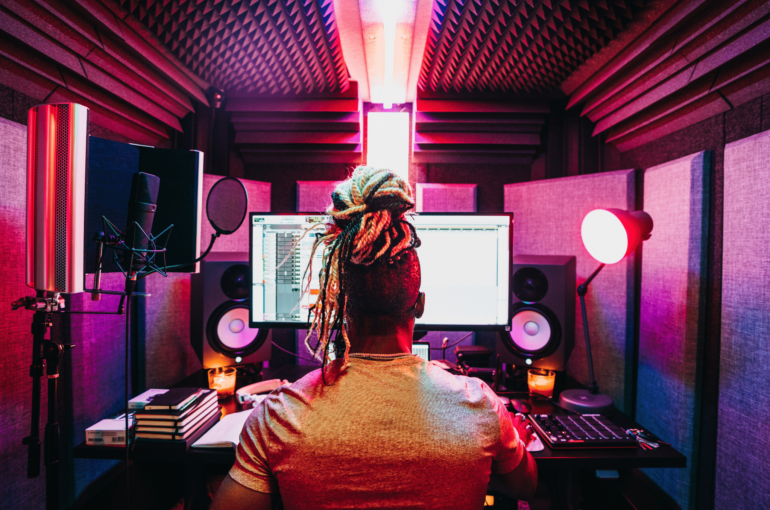TL;DR:
- Tape It, a startup founded by musicians, introduces an AI-powered noise reduction algorithm for audio recordings.
- The AI denoiser is now available as a free web app and will be integrated into the Tape It app.
- The company’s initial focus was on an iOS recording app for musicians, offering instrument detection and annotation.
- Tape It’s AI technology automatically removes background noise, enhancing audio quality for music and field recordings.
- An academic study validates the quality of the software in comparison to industry-leading denoisers.
- The technology combines a neural network controller with a noise reduction algorithm.
- Major studio software vendors and hardware manufacturers have shown interest, with enterprise pricing available.
- Tape It’s unique approach allows creators to focus on creativity by solving the issue of background noise.
Main AI News:
After Apple discontinued its Music Memos app, beloved by musicians for nurturing song ideas, Tape It, a startup founded in 2020 by musicians Thomas Walther and Jan Nash, seized the opportunity to introduce an innovative app driven by artificial intelligence. Initially designed to automatically identify instruments and annotate recordings, Tape It has now taken a significant stride forward by unveiling an automatic studio-quality noise reduction algorithm, also AI-driven, applicable to all forms of audio—not just speech.
This week, Tape It proudly launched its AI denoiser as a free web app, with plans to license the technology to other vendors in the future. Furthermore, this cutting-edge denoising technology will eventually become an integral part of Tape It’s flagship app.
Tape It’s journey began when its founders recognized the need for a user-friendly, AI-enhanced alternative to Apple’s Music Memos. The original app already had the capability to automatically detect instruments and provide visual annotations, making it easier for musicians to navigate their recordings. Musicians could also add their markers, notes, and photos for later reference. The app has since gained significant traction, boasting around 10,000 monthly active users.
As founder Thomas Walther explained at Tape It’s 2021 debut, the company’s vision extended beyond instrument detection. They aspired to harness the power of AI to solve more complex problems in music recording, ultimately leading to the development of an AI-powered denoiser. Over the course of two years, the team crafted a solution that targets background noise, including hums and hisses, prevalent in studio and field recordings.
“What we developed is an automatic version of the denoising software found in professional recording studios for the last 15 years,” said Walther.
To validate its innovation, Tape It is releasing an academic study featuring a scientific listening test that demonstrates the quality of its software compared to industry-leading denoising solutions.
Unlike traditional speech enhancement systems that are unsuitable for music signals and professional denoising systems that demand manual control by experts, Tape It’s technology integrates a neural network controller with a signal processing-based noise reduction algorithm. This breakthrough allows for the automatic denoising of general audio signals, including music—a pioneering achievement that Tape It plans to showcase at the AES conference.
While the denoising product itself has garnered interest from major studio software vendors and hardware manufacturers, Tape It is committed to offering enterprise pricing for these partners. Smaller startups will benefit from more budget-friendly plans.
As Thomas Walther expressed, “Everyone is excited about AI being creative. We are excited about AI solving boring problems. We take care of background noise so you can entirely focus on the creative parts and write more songs.”
AI-powered technologies have also found a home in the podcasting world, with companies like Podcastle introducing Magic Dust AI, a generative AI tool that eliminates background noise and enhances audio quality.
Tape It, consisting of a five-person team spread across Berlin, London, Los Angeles, and Stockholm, boasts an array of talent, including designer and musician Christian Crusius and Christian Steinmetz, a PhD researcher specializing in AI and audio, who played a pivotal role in developing the denoising software.
Despite their success, Tape It remains a bootstrapped company, driven by a desire to maintain a technological edge. While discussions about raising funds are ongoing, the company has yet to make a formal decision, emphasizing the importance of preserving its unique position in the AI market.
Conclusion:
Tape It’s AI-driven noise reduction technology represents a significant advancement in the music recording industry. By automating the denoising process and making it accessible to a wide range of users, including smaller startups, Tape It has the potential to reshape the market, enabling musicians and audio creators to produce studio-quality recordings with ease. This innovation not only addresses a common pain point but also highlights the broader applications of AI in studio software automation, making it a promising development in the field.

